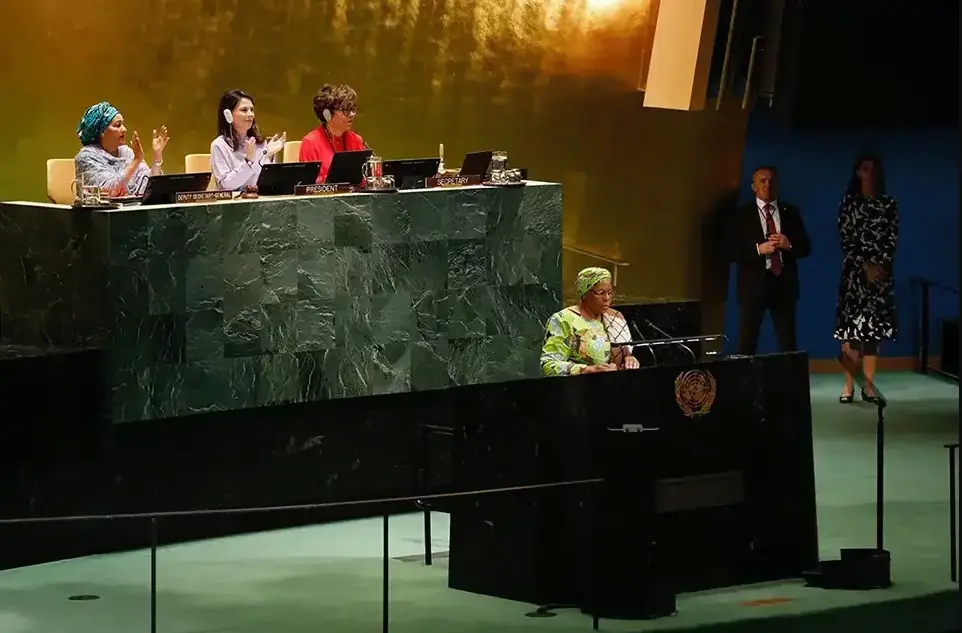In a world marked by conflict, inequality, and institutional distrust, multilateralism faces a paradox: it has never been more necessary, and it has never been so questioned. While international agreements are debated between negotiation fatigue and the urgency of solutions, one fact remains clear: without the full participation of women, multilateralism lacks legitimacy, effectiveness, and stability.
Three decades after the Beijing Declaration and Platform for Action, which marked a milestone in recognizing women’s rights, the gap between rhetoric and reality persists. Women are not just another interest group within the international architecture; they are half of humanity and, increasingly, half of those working to sustain peace, cooperation, and collective well-being. Yet the numbers reveal a striking imbalance. The latest GWL Voices report, Women in Multilateralism, found that in the United Nations, only 21% of permanent representatives were women in 2024. Historically, only 7% of the more than 2,800 permanent representatives to the UN since 1947 have been women, and 19 of the main international organizations have never had a woman in their top leadership position.
Faced with this scenario, a generation of women from Ibero-America is redefining how to understand and practice multilateralism. They do so from ministries, international organizations, universities, civil society networks, and social movements. They speak different languages and come from diverse disciplines, but they share a common conviction: international cooperation must serve to improve real lives, not just produce statements. They understand that the success of multilateralism is not measured by the number of resolutions it adopts, but by its capacity to translate them into policies that promote peace and development in tangible ways.
Multilateralism as a daily practice
Multilateralism is often perceived as a distant structure, a set of institutions, summits, and protocols that are inaccessible. But in its deepest sense, it is a practice: the ability to listen to others, find common ground in difference, and recognize that global problems require shared solutions. In this practice, women bring a fundamental perspective, anchored in prevention, cooperation, and a comprehensive vision of security.
This perspective has transformed contemporary diplomacy. Women leading global agendas today tend to link large objectives to the real lives of people. In peace processes, the evidence is clear: when women participate, agreements are 35% more likely to last at least fifteen years. Without a solid foundation of peace, any development effort is doomed to be unstable. The same applies to international policies that integrate gender equality from the outset rather than as an afterthought.
In this context, the leadership of Ibero-American women is especially significant. Over the last decades, the region has promoted their political participation at the highest level. The commitment of most Latin American countries to adopting quota systems explains, to a large extent, why the region is now the second in the world in female parliamentary representation.
Our region has historically been a laboratory of cooperation, with political and social dialogue mechanisms predating even other regions of the world. But it has also been a territory of deep inequalities, where women have had to forge paths in complex contexts, sustaining communities, fostering networks, and creating new forms of “bottom-up” diplomacy. From environmental defenders in the Amazon to peace negotiators and academics providing evidence for public policy, Ibero-American women are expanding the boundaries of multilateralism.
Moreover, women bring broad perspectives that enrich global debate. The voices of Indigenous, Afro-descendant, rural, and young women are indispensable for building more representative cooperation. They remind us that cooperation and solidarity cannot be only between states, but also between peoples; not only between governments, but also between communities facing common challenges from different contexts.
Persistent Challenges in the Region
Despite progress, cultural and regulatory barriers persist that hinder the full inclusion of women. Local-level representation, for example, remains an unfinished task: only 16% of mayorships are held by women. It is crucial to focus efforts in this area, where decisions have a direct impact on daily life.
Another major obstacle is political violence—a phenomenon in which Ibero-America has been a pioneer in identifying and legislating, but which continues to restrict the participation of many women. Levels of violence in the region remain alarming: nearly 80% of women in politics report having experienced or witnessed some form of violence. Added to this is the unequal distribution of unpaid work. Historically invisible care tasks fall disproportionately on women, who spend on average three times more time than men on these duties.
Towards a future of full participation
The question, then, is not whether women should be present in the multilateral system and decision-making, but how to ensure that their participation is full and sustained. This requires at least three fundamental transformations:
First, recognize women’s leadership as a structural part of the system. This implies promoting parity in international organizations, opening spaces for training and mentorship, and ensuring conditions that allow leadership to coexist with personal and family life for everyone.
Second, strengthen networks of cooperation among women from different regions and disciplines. The accumulated experience in Ibero-America—of resilience, innovation, and dialogue—can enrich global processes. South-South alliances and Ibero-American cooperation are catalysts for a new diplomacy, more horizontal and empathetic.
Third, translate equality into concrete results. It is not enough to have women at negotiation tables; the impact of their decisions on peace, education, or the economy must be recognized and documented. Equality must be a principle, a working method, embedded throughout the cycle of public policies and international agreements.
The future of multilateralism will depend on its capacity to reinvent itself. The experience and leadership of women are essential to building a more cooperative and effective international order. Their voices do not merely claim a place; they are transforming the way we understand cooperation. They remind us that multilateralism is not sustained by treaties, but by trust. That peace is not signed—it is built. And that equality is not a destination, but a way of walking.
A multilateralism without women is not only incomplete: it is ineffective. And the world, now more than ever, needs all of their intelligence, experience, and voice.
*This text is part of the collaboration between the Organization of Ibero-American States for Education, Science and Culture (OEI) and Latinoamérica21 for the dissemination of the platform Ibero-American Women’s Voices. Discover and join the platform HERE.













